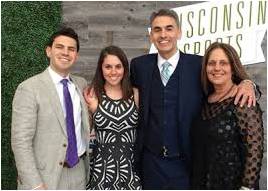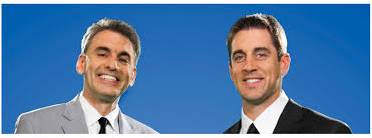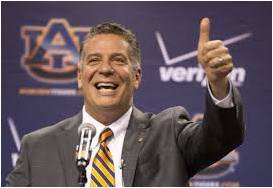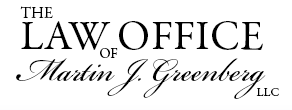 I am now completing my forty-third year as a law professor at Marquette University Law School. In 1982, I taught a course at the law school with respect to the representation of professional athletes in contract negotiations. At that time, I first met a young man from New Jersey who played basketball at the University of Delaware, and his name was David Gruber. At the conclusion of my course, I forecasted that David Gruber would be the next “Jerry McGuire.” Little did I know that his future wife, Nancy, was also a Marquette classmate. Turning the clock forward to 2013, almost thirty years later, David’s son, Steven Gruber, a graduate of Brown University and a member of Brown’s men’s basketball team, was one of my students for both classes I teach – Representing Professional Athletes and Coaches and Sports Venues: From Election Day to Game Day. Steven was one of the best students I’ve had in my forty-three year teaching career and we jointly published a law review article entitled You Get Hired to Get Fired, 24 Marq. Sports L. Rev. 141 (2013).[1] Steven graduated magna cum laude from Marquette University Law School.
I am now completing my forty-third year as a law professor at Marquette University Law School. In 1982, I taught a course at the law school with respect to the representation of professional athletes in contract negotiations. At that time, I first met a young man from New Jersey who played basketball at the University of Delaware, and his name was David Gruber. At the conclusion of my course, I forecasted that David Gruber would be the next “Jerry McGuire.” Little did I know that his future wife, Nancy, was also a Marquette classmate. Turning the clock forward to 2013, almost thirty years later, David’s son, Steven Gruber, a graduate of Brown University and a member of Brown’s men’s basketball team, was one of my students for both classes I teach – Representing Professional Athletes and Coaches and Sports Venues: From Election Day to Game Day. Steven was one of the best students I’ve had in my forty-three year teaching career and we jointly published a law review article entitled You Get Hired to Get Fired, 24 Marq. Sports L. Rev. 141 (2013).[1] Steven graduated magna cum laude from Marquette University Law School.
Gruber Law Offices and David Gruber are everywhere – on your TV, in your telephone book, up on billboards – probably one of the best known and most publicized and best marketed law firms in the country. Yes, “it’s one call and that’s all,” and that’s David Gruber. When people think of personal injury firms, they think of David Gruber. Certainly it didn’t hurt to connect himself with Aaron Rogers and the community and public service announcements on television and http://itsaaron.com/.

David Gruber has been honored by the National Trial Lawyers as one of the top 100 trial lawyers and also has been named the Best Personal Injury Attorney in Milwaukee.
What is not often publicized and maybe not as well known is that the Grubers, and I mean David, Nancy (Cum laude Marquette University Law School) and Steven, are superb contract lawyers who have been involved in the contract negotiations for Bruce Pearl’s contract with the University of Tennessee (Tennessee) and Pearl’s most recent contract with Auburn University (Auburn) that is worth approximately $15 million. The relationship started when Pearl was the head basketball coach for the University of Wisconsin-Milwaukee where Pearl led the Panthers to the NCAA Tournament’s Sweet Sixteen in 2005. After Pearl left UWM for Tennessee, Gruber and Pearl maintained a long-distance friendship. [2]
Pearl coached at Tennessee from 2005-2011, compiled 145 wins and 61 losses (7.704%), and took the Volunteers to the NCAA tournament in each year that he coached the team. Pearl received SEC Coach of the Year in 2006 and 2008.
Steven also played basketball with Pearl’s son, Steve Pearl, on the Maccabi USA Open Men’s Basketball Team in 2009. Bruce Pearl coached the team.[3]
In December of 2008, Pearl allegedly invited a high school junior by the name of Aaron Craft and members of his family to a cookout at Pearl’s Knoxville home while Craft was on a non-official visit to Tennessee – which violated NCAA rules. When the NCAA began an investigation, Pearl allegedly lied about the cookout. In September of 2010, Pearl acknowledged the violations and also admitted lying to the NCAA. Pearl was fired from Tennessee on March 21, 2011, and on August 23, 2011 Pearl was given a three year Show Cause penalty by the NCAA, effective until August 23, 2014.
A Show Cause Order essentially means that the sanctions imposed on Pearl will remain in force if he is hired by another NCAA member school within that period. Specifically he is prohibited from engaging in any recruiting activities which means he cannot contact recruits, although he may evaluate talent during that time period. So therefore a Show Cause penalty is an administrative punishment ordering that any NCAA penalties imposed on a coach found to have committed major rules violations stays in effect for the sanctions full duration, and also can be transferred to any other NCAA member school that hires the coach while the sanctions are still in effect. David Gruber was also Pearl’s co-counsel in Pearl’s NCAA rules violation case at Tennessee.
Following his firing, Pearl worked for ESPN as an on-air basketball analyst and also held an executive position at a Knoxville, Tennessee wholesale distributor, H.T. Hackney Co.[4]
I have been teaching the subject of coaching contracts as well as representing coaches in contract negotiations and terminations for at least twenty-five years. I must say, the Grubers not only negotiated a good contract for Pearl at Auburn, but the contract was well-drafted and contained creative and unique contract clauses. Moreover, the contract was fair from both the coach’s perspective as well as the University’s perspective. Some of those provisions in the 35-page contract, a copy of which is attached, include:
- Reporting Relationship
- Hiring of assistant coaches and favorable clearance from the NCAA and SEC
- Signing Bonus
- Defined salary increases and term extension
- A bonus laced contract
- Bonuses are cumulative
- Attendance Bonus
- Unique automotive provisions
- The handling of the Show Causes Order with respect to violations and sanctions
- Rules violations and suspensions
- Assignment of personal endorsement rights
- Mitigation of damages
- De-escalating buyout
- Life insurance protection[5]
Let me comment on some of the clauses of the Pearl Employment Agreement that were particularly well drafted and unique:
Usually salary increases and term extensions are subject to question in a coach’s contract. Pearl’s contract has a specific methodology for determination of the same by evaluation of the coach’s performance in four primary areas: (1) academics assessment of his student athletes, as indicated in part by compliance with NCAA and SEC academic progress requirements; (2) competitive success; (3) compliance with University, SEC, NCAA, and other rules and regulations; and (4) fiscal responsibility within the University men’s basketball program. No later than May 1st, the Athletic Director shall conduct an annual performance review. The results are determinative of salary increase and contract extension.
The Pearl contract is bonus laced. But included in the bonuses is an attendance bonus that states if half, or greater than half, of University’s home games are sold out then the University shall pay coach $50,000.00.
Pearl has a well defined automobile allowance clause where the University will furnish him two new dealer automobiles or a car allowance not to exceed 5% of base salary per vehicle. The car allowance is limited to two vehicles and will not exceed a total of $25,000.00 for the two automobiles. The University is responsible and reliable for gas, service, maintenance, and insurance on any dealer vehicles furnished. The University is also responsible for the purchase and payment for liability, excess, and umbrella insurance policies. If Pearl utilizes the car allowance instead of using dealer cars, then he is responsible for gas, service, maintenance, and insurance.
Death usually ends a coach’s employment agreement and represents an event of termination. Pearl’s contract has a life insurance provision where the University is responsible to maintain a term life insurance policy in the amount of $3,000,000.
When reviewing a contract the contract must be fair to both parties. The University certainly got some of the terms that it needed most, including a well drafted mitigation of damage clause in the event of without cause termination.
In the event Coach obtains another basketball coaching or basketball-related position with a college, university or professional team (such as but not limited to a non-coaching staff member, scout or professional team employee) after his termination or receives coaching-related income, the amount earned or received by Coach will be subtracted from the amount the University owes Coach under this Paragraph. Coach acknowledges that he is required to use reasonable efforts to obtain other employment and/or income from third-parties, and he is required to provide immediate written notice to the University Athletics Director of such earnings or income, whether such earnings or income are received prior to June 30, 2020 or deferred for later payment within three years of the end of the Buy Out period.
Coach also acknowledges that he is obligated to act in good faith and may not accept an amount lower than the fair market value or going rate for his services for any such basketball coaching or basketball-related position (as defined above), or otherwise attempt to allow third parties to take advantage of this University Buy-Out agreement as a means of avoiding paying the fair market value for his services. In the event Coach breaches theses obligations, the University will have the right at its sole discretion to (1) be completely relieved of any obligation to make any remaining payments owed on the Buy-Out Amount; or (2) adjust the amount offset to reflect the fair mark value or going rate for the employment or work done.
Since Pearl traveled the path of rules violation and a show cause order, there are five pages spent on compliance with policy rules and regulations, including consequences for violation of the show cause order.
Auburn took Pearl as a head coach even though he brought with him existing sanctions under the show cause order. As Gruber said, the SEC loves Pearl and even though he brought with him existing and continuing sanctions, the Grubers were still able to negotiate an excellent contract even with the taint of the show cause order.
David Gruber is well known in Milwaukee circles as being one of Milwaukee’s premier personal injury lawyers. Little, if anything, is known about his and his family’s ability as lawyers to negotiate contracts. Look out agents if this group decides to get into that business because the Pearl contract is as good as the best ones that I have reviewed over the last 25 years.
In an article appearing in the Journal-Sentinel on March 25, 2014, Gruber indicated that he would be sticking to personal injury cases.[6]
 Pearl calls Gruber one of his closest advisors and credits Gruber with being one of the businesses that boosted UWM men’s basketball with sponsorship during Pearl’s tenure. “I had one of the best contract in college athletics,” Pearl said of Gruber’s work, “until I screwed up.”[7]
Pearl calls Gruber one of his closest advisors and credits Gruber with being one of the businesses that boosted UWM men’s basketball with sponsorship during Pearl’s tenure. “I had one of the best contract in college athletics,” Pearl said of Gruber’s work, “until I screwed up.”[7]
Gruber said that Pearl “is an interesting figure. They love him in the SEC. He’s a savior down there.”[8]
Congratulations! Marquette Law School your sports law program truly creates “sports lawyers.”
[1] http://scholarship.law.marquette.edu/cgi/viewcontent.cgi?article=1613&context=sportslaw
[2] http://www.bizjournals.com/milwaukee/blog/2014/03/david-gruber-advised-basketball-coach-bruce-pearl.html
[3] http://www.bizjournals.com/milwaukee/blog/2014/03/david-gruber-advised-basketball-coach-bruce-pearl.html
[4] http://www.bizjournals.com/milwaukee/blog/2014/03/david-gruber-advised-basketball-coach-bruce-pearl.html and http://www.bizjournals.com/milwaukee/blog/2011/12/bruce-pearl-called-david-gruber-for.html?s
[5] The 35 page Employment Agreement effective March 18, 2014: https://www.scribd.com/doc/228491265/Bruce-Pearl-s-six-year-contract-at-Auburn
[6] http://m.jsonline.com/sports/blogs/252291811.html
[7] http://www.bizjournals.com/milwaukee/blog/2011/12/bruce-pearl-called-david-gruber-for.html?s
[8] http://www.bizjournals.com/milwaukee/blog/2014/03/david-gruber-advised-basketball-coach-bruce-pearl.html


